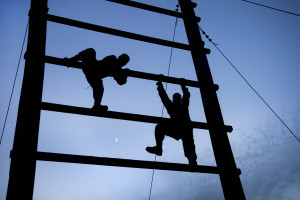Growing up with childhood domestic violence teaches us to believe a set of LIES about ourselves. These lies tell us we’re worthless, fearful, angry, alone, guilty, sad, hopeless, resentful, unattractive, and unloved. Though it isn’t difficult to understand what prompted these false beliefs and why we feel this way, they do not have to dictate who we are or what we can achieve in life.
Your actions and feelings are a reflection of your beliefs and self-concept and are typically consistent. According to leading researchers, one weakness of the human species is that one’s beliefs, formed in childhood, serve as a filter for everything encountered later in life. So, you’re more likely to find evidence in everyday life reinforcing the beliefs you hold true while overlooking any evidence that might suggest the contrary. That’s the way your brain is programmed to see the world – through a skewed lens that steals your true identity and keeps you trapped by a warped belief system and self-concept.
When your beliefs and self-concept are poor, you tend to take in only that information which reinforces your negative feelings about yourself and expectations of others, while filtering out information that doesn’t support these feelings. So, because growing up in a house with domestic violence made you feel worthless, afraid, sad, angry, resentful, hopeless, unloved, etc., you are likely to continue feeling this way throughout life.
As children of domestic violence, many of these Lies are so ingrained in us that they’ve become gospel, and we get so caught up in living them that they completely blind us to the Truth. They invade every aspect of our lives, govern our actions and dictate our choices. They feed in us all the fears, uncertainties, and doubts we have about ourselves and others, and remind us every day that we’re “damaged,” “less than,” that we “CAN’T.” We feel weak, incapable of accomplishing the things we want, which seem completely out of our reach.
It’s like an old fashioned scale where on one side are stacked the strongest positive memories, while on the other are the strongest negative memories. Growing up with domestic violence tips the scale considerably in favor of the negative memories, robbing you of reaching your full potential before you even realize you can.
Resiliency is the unique essence, the power hidden inside of us to bounce back, to pick ourselves up after a fall and press ahead, to persevere in the face of adversity, to master our own faith. For some, it is stronger than for others. Ironically, resiliency is a unique gift each child of domestic violence has within them naturally, because they were conditioned with this special gift, this uncommon strength, by the adversity experienced at such a young age, which had them solving problems and figuring out how to survive night after night. They made it through countless nights of terror and pain, they survived, they persevered, they were resilient.
But the Lies you learned along the way stay with you and keep you from seeing and realizing your resilience. Convinced of all the reasons why you’re “less then,” why you “CAN’T,” you may fail to see that precisely because of what you went through, you uniquely “CAN.” That you’re conditioned to be resilient and to overcome any obstacle before you, because, after all, you had plenty of training, starting in early childhood. You were tested repeatedly and you repeatedly rose to the occasion. It was you resiliency that kept you going, kept you surviving, kept you alive. It was because of your resilience then you’re here now.
Of course, this is not to say that there are no weaknesses, challenges, or barriers before you. But believing they’re insurmountable, admitting defeat, and folding when temporary hurdles arise can keep you from all the things that are fully within your grasp. It’s only by looking deeper for the TRUTHS that lie beneath the surface and challenging you limitations that you can achieve the goals that have always eluded us. Your innate resiliency will lead the way.

120316-A-XN107-604 Soldiers climb an obstacle during a noncommissioned officer professional development event at Fort Bragg, N.C., on March 16, 2012. The soldiers, assigned to the U.S. Army Reserve Command headquarters, negotiated the obstacles and provided teamwork when necessary to complete each station. DoD photo by Timothy L. Hale, U.S. Army. (Released)
The moment that resiliency is recognized, understood, and embraced is the moment that the hold the LIES have over you begins to fade and you can start to live the life you were always meant to live. With that conscious realization, you begin to free yourself of the false illusions and self-imposed limitations that keep you from reaching further, climbing higher, pursuing your full potential and all the rewards that come with it.
The reverse is also true. As you begin to unlearn the LIES, your resiliency organically resurfaces and flourishes. Leveraging that resiliency can help you shorten the gap between “impossible” and “possible” and push you past your perceived limitations into new frontiers of possibility. Embrace your resiliency – realize it has always been in you and is a natural by-product of your difficult, turbulent, chaotic childhood. It is the unexpected gift of your childhood adversity. Make it count. It’s a powerful force that can help you realize your childhood does not define you and place your destiny in your own hands. Channel your resiliency into all the things you pursue in daily life – it will put you on the path to reaching your full potential and lead you past the obstacles that stand in your way. What can possibly stop you now?

